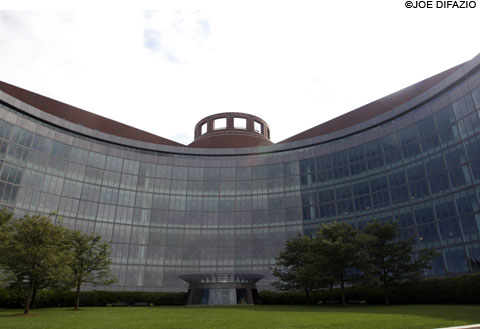
TALE OF TERROR On Octoeber 21, 2009, US Attorney Michael Loucks stood solemnly in front of a Department of Justice seal and described Tarek Mehanna as the architect of a maniacal terror plot. |
On a late-fall day in 2008, a 26-year-old Massachusetts College of Pharmacy PhD named Tarek Mehanna left his parents' Sudbury home to start a new life in Riyadh, Saudi Arabia, where he had received a prestigious appointment in the diabetes department at the King Fahad Medical City.He didn't make it. On his way to Saudi Arabia via New York, Mehanna was arrested at Logan Airport by FBI agents, who charged him with lying about his relationship to a man who would later plead guilty to training with a foreign terrorist organization.
Mehanna was released on bail, but the FBI wasn't done with him. A year later, in the early hours of October 21, 2009, federal agents came after Mehanna again, taking him back into custody at the home of his Egyptian-born parents. This time, however, the charges were more substantial: Mehanna, the government alleged, had conspired to provide material support to terrorists.
That evening, acting United States Attorney Michael Loucks held a televised press conference to announce Mehanna's capture. Loucks stood solemnly in front of a Department of Justice seal and described a maniacal domestic terror plot that the FBI had foiled. According to Loucks, Mehanna had held "multiple conversations about obtaining automatic weapons and randomly shooting people in a shopping mall, a planned jihadist activity apparently inspired by the DC sniper incidences in 2002." There were also alleged plans to assassinate two federal officials.
Mehanna has spent the last two years in solitary confinement in G Block of the Plymouth House of Corrections. If convicted, he faces up to life in a federal penitentiary. His trial is scheduled to begin Monday, October 24, in Boston's US District court before Judge George O'Toole. O'Toole will have his hands full: Mehanna's defense lawyer is J.W. Carney, whose other famous client is James "Whitey" Bulger.
The case against Tarek Mehanna is sensational, extremely serious — and secret. Under laws adopted to prosecute terrorism in the wake of the 9/11 attacks, the federal government can keep much of its case against Mehanna — or anyone else for that matter — under wraps. And that is exactly what Attorney General Eric Holder did in July, when he asked that evidence gathered under the Foreign Intelligence Surveillance Act be reviewed by O'Toole privately, and not handed over to Mehanna's defense team — a tactic that makes the charges difficult to defend, and that makes it nearly impossible to determine whether Mehanna is getting a fair shake.
Barring any last-minute changes, the government case against Mehanna revolves around two points: conspiring to support terrorists and lying to federal investigators. Mehanna and his lawyers do not dispute that Mehanna, in a wide range of online communication, was actively critical and extremely disapproving of America's wars in Iraq and Afghanistan in particular and censorious of national policy toward the Muslim world in general. He was vocal with his disdain and frustration surrounding US soldiers killing Muslims, occupying Muslim countries, torturing insurgents in Guantánamo Bay and Abu Ghraib, and the continuous media fear frenzy that had labeled Muslims as a dangerous minority in the United States and Europe. He would blog about his frustrations and discussed his views with his fellow Muslims in the community.